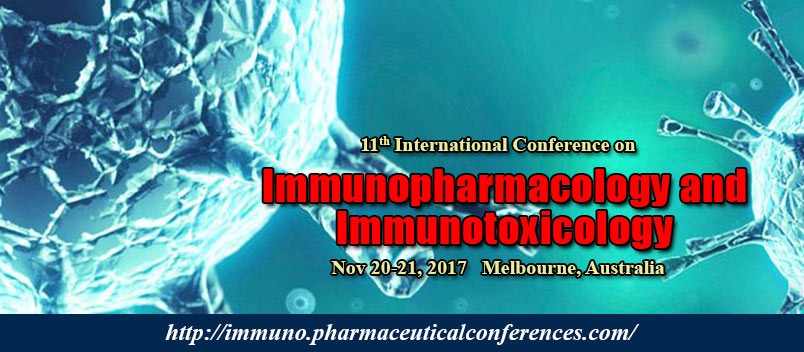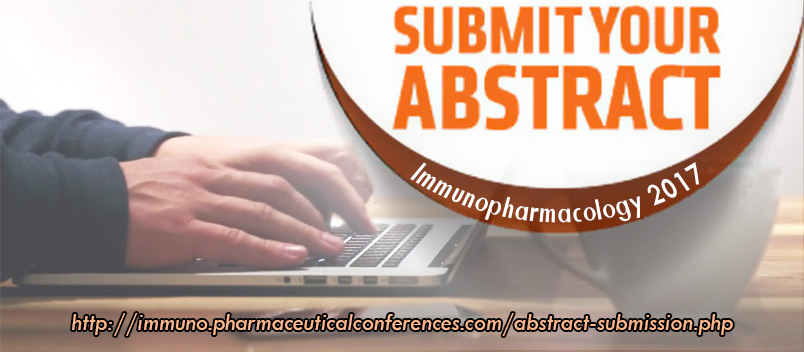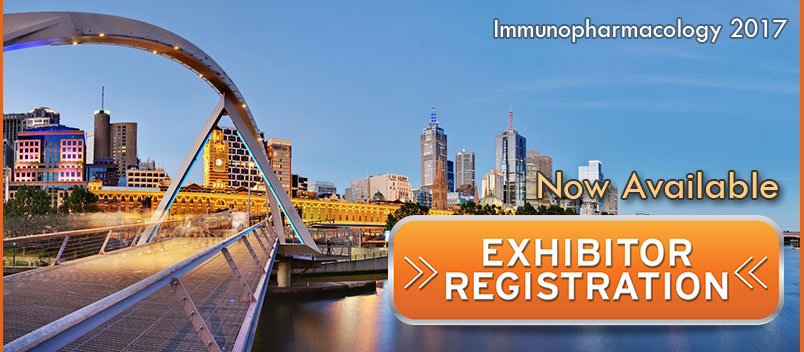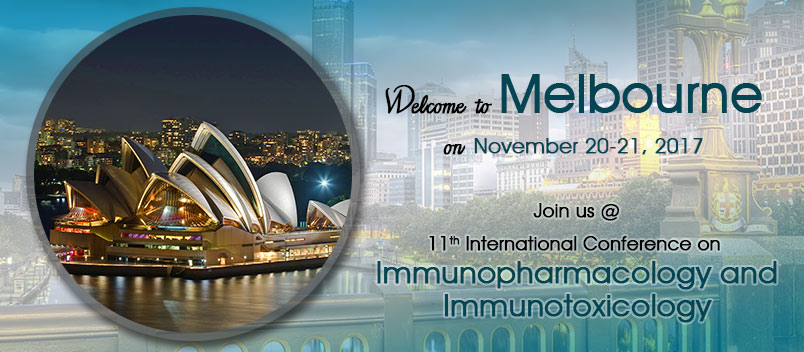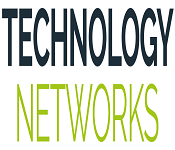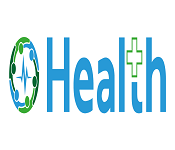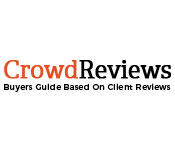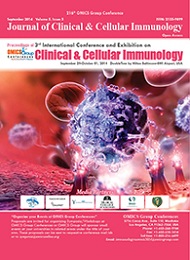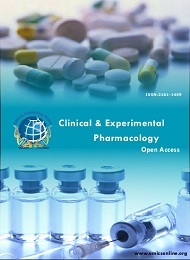Theme: Novel Development and Applications in Immunology and Immunopharmacology
Immunopharmacology 2017
ConferenceSeries Ltd is a renowned organization that organizes highly notable pharmaceutical conferences throughout the globe.
After a successful conference of Pharmcology 2016, ConferenceSeries Ltd is currently bringing forth " 11th International Conference on Immunopharmacology and Immunotoxicology" (Immunopharmcology 2017) slated on November 20-21, 2017 at Melbourne, Australia. The conference invites all the participants across the globe to attend and share their insights and convey recent developments in the field of Immunology, Pharmacology and Toxicology.
2017 Highlights:
- 200+ Participation (70% Industry: 30% Academia)
- 9+ Keynote Speakers
- 30+ Plenary Speakers
- 3+ Exhibitors
- 14 Innovative Educational Sessions
- B2B Meetings
ConferenceSeries Ltd is proud to announce the 11th International Conference on Immunopharmacology and Immunotoxicology, which is to be held during November 20-21, 2017 at Melbourne, Australia.
On this great gathering, Organizing Committee invites participants from all over the globe to take part in this annual conference with the theme “Novel Development and Applications in Immunology and Immunopharmacology”. Immunopharmacology 2017 aims at sharing new ideas and new technologies amongst the professionals, Physicians and students from research areas of Immunology, Pharmacology and Toxicology to share their recent innovations and applications and indulge in interactive discussions and technical sessions at the event. The Conference will also have a space for companies and/or institutions to present their services, products, innovations and research results.
Importance and Scope:
Immunopharmacology is a crossover science which has been established upon the standards, hypothesis, and specialized advancements of both immunology and pharmacology, yet which has an exceptional personality joining both fundamental and connected regions of research. Essential immunopharmacological explore is worried about the basic components by which endogenous and engineered chemicals communicate with the cells of the safe framework. Essential territories of research incorporate the activities of chemicals, for example, lymphokines, cytokines, supplement, kinins, autacoids, medicates, and even neuropeptides on insusceptible capacity. Connected immunopharmacology is worried about the improvement and testing of new immunomodulatory drugs which will be of advantage to clinical medication yet in addition as essential research apparatuses. Previously, the two fields of immunology and pharmacology have added to each other in numerous huge ways. Immunology has added to pharmacological research by the improvement of antibodies which are as often as possible utilized today as particular tests for the quantitative and subjective examination of a wide range of classes of chemicals of intrigue. Pharmacology has added to the field of immunology by giving fundamental pharmacological data on subjects, for example, the go betweens of excessive touchiness responses and aggravation. Later on, the genuinely cross breed field of immunopharmacology guarantees to have a growing part in clinical medication and fundamental research. This forecast depends on the perception that recombinant lymphokines and newfound immunomodulatory substances have started to enter the facility in regularly expanding numbers. Future immunopharmacological research will incorporate the investigation of the pharmacology of these lymphokines yet in addition the discerning advancement of new medications that go about as adversaries or agonists for the endogenous lymphokines that typically manage the safe reaction.
Critical advance has happened in the fields of fundamental and clinical immunology in the course of recent years, prompting the foundation and approval of touchy strategies for surveying resistant framework changes in people and additionally research facility creatures. Worry over the potential harmful impacts of chemicals and certain medications on the safe framework provoked the use of these strategies to survey the security assessment of the insusceptible framework and the foundation of the subdiscipline of immunotoxicology inside toxicology. Strategies have been chosen and upgraded for rat testing, which have prompted national and universal relative examinations to exhibit the reproducibility and utility of these techniques for foreseeing safe framework impacts. Labs for the examination of immunotoxicity have, moreover, been set up amid the previous 10 years among modern research bunches for the assessment of new chemicals and medication hopefuls. 6 years back, Sterling Winthrop Inc. built up an immunotoxicology research center devoted to tranquilize revelation and improvement exertion. Experience has shown that immunotoxicological appraisal can speak to an imperative part of any medication wellbeing assessment, and need not be a normal screening technique, but rather ought to be driven by information suggestive of an invulnerable framework impact or worry over the substance class of the operator. Examines for the assessment are chosen from a menu of approved techniques on a case-by-case premise. Immunotoxicology will keep on playing a more critical part in the wellbeing and hazard evaluation process, due to the urgent part of the safe framework in have resistance. This review depicts the structure, association and capacity of the resistant framework, and involvement with immunological strategies advancement, application to and involvement in the preclinical improvement of new synthetic medication elements and in vitro applications.
Why to attend???
International Conference on Immunopharmacology and Immunotoxicology 2017 which is going to be the biggest conference dedicated to Immunology, Pharmacology and Toxicology professionals providing a premier technical forum for reporting and learning about the latest new generation technologies developed during the course of time along with discussing their applications. Events include hot topics presentations from all over the world and professional networking with industries, leading working groups and panels.
Meet Your Objective Business sector with individuals from and around the globe concentrated on finding out about the latest research works, developments in the fields of Immunology and Toxicology. This is the best chance to achieve the biggest collection of members from everywhere throughout the World. Conduct shows, disperse data, meet with current, make a sprinkle with another product offering, and get name acknowledgment at this occasion. Widely acclaimed speakers, the latest methods, strategies, and the most up to date overhauls in Immunopharmacology and Immunotoxicology are signs of this meeting.
Target Audience:
- Scientists.
- Professors.
- Research Scholars and students.
- Vaccinology/Immunology Researchers.
- Associations and Societies for collaboration and sponsorship.
- Manufacturing Medical Devices Companies for Exhibition.
- Vaccine policy makers and manufacturers can exchange ideas and collaboration.
- Policy and decision makers with disciplines in the field of vaccination and therapeutics.
- Vaccine stakeholders including academic researchers, public health clinicians, veterinarians.
Track 1- Pharmacology:
Pharmacology is the study of how drugs affect the body and how the body affects drugs. Pharmacology is a branch of biomedical science, encompassing clinical pharmacology, which is concerned with the effects of drugs/pharmaceuticals and other xenobiotics on living systems, as well as their development and chemical properties. Pharmacology is often described as a bridge science because it incorporates knowledge and skills from a number of basic science disciplines including physiology, biochemistry and cell and molecular biology. Pharmacologists are able to 'translate' such knowledge into the rational development of therapeutics. As a result of their multidisciplinary training, pharmacologists are able to offer a unique perspective in solving drug, hormone and chemical-related problems. The principles of Pharmacology are pharmacodynamics and pharmacokinetics.
Recommended Immunopharmacology Conferences:
8th World Congress on Pharmacology and Congress on Toxicology, July 24-26, 2017, Melbourne, Australia; 12th Annual Pharma Middle East Congress, Sep 25-27, 2017, DUBAI, UAE; 9thAnnual Meeting on Immunology and Immunologist, July 03-04, 2017, Kualalumpur, Malaysia; 10th International Conference on Neuropharmacology and Neuropharmaceuticals, Oct 23-24, 2017, Dubai, UAE; World Immunology Congress, Dec 14-15, 2017, DUBAI, UAE; International Conference on Toxicology and Pharmacology, November 1-2, 2017,Toronto, Canada; Second International Convention IMMUNOPHARMACOLOGY - VACCIPHARMA 2017, Jun 25-27, 2017, Cuba; Pharmacology for Advanced Practice Clinicians, November 6 – 12,2017, Las Vegas; 2017 Spring
Track 2- Immunopharmacology:
Immunopharmacology is a branch of pharmacology concerned with the application of immunological techniques and theory to the study of the effects of drugs especially on the immune system. It is the immunological effects and significance of a particular drug such as morphine. The science of immunopharmacology aims to manipulate the immune system by modifying the endogenous immune responses to the benefit of the host in the treatment of diseases. The term immunopharmacology originally dates from 1959 when Andor Szentivanyi used it to relate the function of the nervous system to the immune system, and throughout the 1960s the term appeared with reference to the radioimmunoassay of drugs and hormones. The division into immunosubstituion, immunosuppression, antiallergic substances and immunostimulation gives the heterogeneous material a tighter structure than would any classification according to origin, chemical structure or mechanism of action.
Recommended Immunopharmacology Conferences:
8th World Congress on Pharmacology and Congress on Toxicology, July 24-26, 2017, Melbourne, Australia; 12th Annual Pharma Middle East Congress, Sep 25-27, 2017, DUBAI, UAE; 9thAnnual Meeting on Immunology and Immunologist, July 03-04, 2017, Kualalumpur, Malaysia; 10th International Conference on Neuropharmacology and Neuropharmaceuticals, Oct 23-24, 2017, Dubai, UAE; World Immunology Congress, Dec 14-15, 2017, DUBAI, UAE; International Conference on Toxicology and Pharmacology, November 1-2, 2017,Toronto, Canada; Second International Convention IMMUNOPHARMACOLOGY - VACCIPHARMA 2017, Jun 25-27, 2017, Cuba; Pharmacology for Advanced Practice Clinicians, November 6 – 12,2017, Las Vegas; 2017 Spring
Track 3- Immunotoxicology:
Immunotoxicology is the study of immune dysfunction resulting from exposure of an organism to a xenobiotic. The immune dysfunction may take the form of immunosuppression or alternatively, allergy, autoimmunity or any number of inflammatory-based diseases or pathologies. Because the immune system plays a critical role in host resistance to disease as well as in normal homeostasis of an organism, identification of immunotoxic risk is significant in the protection of human, animal and wildlife health. This guidance makes recommendations to sponsors of investigational new drugs (INDs) on the parameters that should be routinely assessed in toxicology studies to determine effects of a drug on immune function. When additional immunotoxicity studies should be conducted. When additional mechanistic information could help characterize the significance of a given drug’s effect on the immune system. This guidance is intended for drug products and does not apply to biological products.
Recommended Immunopharmacology Conferences:
8th World Congress on Pharmacology and Congress on Toxicology, July 24-26, 2017, Melbourne, Australia; 12th Annual Pharma Middle East Congress, Sep 25-27, 2017, DUBAI, UAE; 9thAnnual Meeting on Immunology and Immunologist, July 03-04, 2017, Kualalumpur, Malaysia; 10th International Conference on Neuropharmacology and Neuropharmaceuticals, Oct 23-24, 2017, Dubai, UAE; World Immunology Congress, Dec 14-15, 2017, DUBAI, UAE; International Conference on Toxicology and Pharmacology, November 1-2, 2017,Toronto, Canada; Second International Convention IMMUNOPHARMACOLOGY - VACCIPHARMA 2017, Jun 25-27, 2017, Cuba; Pharmacology for Advanced Practice Clinicians, November 6 – 12,2017, Las Vegas; 2017 Spring
Track 4- Autoimmune Disorders:
Autoimmune diseases are a broad range of related diseases in which a person’s immune system produces an inappropriate response against its own cells, tissues and/or organs, resulting in inflammation and damage. There are over 80 different autoimmune diseases, and these range from common to very rare diseases. Depending on the type, an autoimmune disease can affect one or many different types of body tissue. It can also cause abnormal organ growth and changes in organ function. There are many autoimmune disorders. Some of the more common autoimmune disorders include Grave’s disease, rheumatoid arthritis, Hashimoto thyroiditis, type 1 diabetes mellitus, systemic lupus erythematous (lupus), and vasculitis. Additional disorders that are believed to be autoimmune include Addison disease, polymyositis, Sjogren’s syndrome, progressive systemic sclerosis, many cases of glomerulonephritis (inflammation of the kidneys), and some cases of infertility. Symptoms vary depending on the disorder and the part of the body affected. Some autoimmune disorders affect certain types of tissue throughout the body—for example, blood vessels, cartilage, or skin. Other autoimmune disorders affect a particular organ. Virtually any organ, including the kidneys, lungs, heart, and brain, can be affected. The resulting inflammation and tissue damage can cause pain, deformed joints, weakness, jaundice, itching, difficulty breathing, accumulation of fluid (oedema), delirium, and even death. Since many autoimmune diseases share similar symptoms, diagnosis is often challenging. The diagnosis of autoimmune diseases differs based on the specific disease. Diseases can sometimes take years to diagnose because many symptoms of autoimmune disorders mimic other diseases. The treatment for the autoimmune disorders include the drugs that suppress the immune system, including corticosteroids and for some autoimmune disorders, plasma exchange and intravenous immune globulin.
Recommended Immunopharmacology Conferences:
8th World Congress on Pharmacology and Congress on Toxicology, July 24-26, 2017, Melbourne, Australia; 12th Annual Pharma Middle East Congress, Sep 25-27, 2017, DUBAI, UAE; 9thAnnual Meeting on Immunology and Immunologist, July 03-04, 2017, Kualalumpur, Malaysia; 10th International Conference on Neuropharmacology and Neuropharmaceuticals, Oct 23-24, 2017, Dubai, UAE; World Immunology Congress, Dec 14-15, 2017, DUBAI, UAE; International Conference on Toxicology and Pharmacology, November 1-2, 2017,Toronto, Canada; Second International Convention IMMUNOPHARMACOLOGY - VACCIPHARMA 2017, Jun 25-27, 2017, Cuba; Pharmacology for Advanced Practice Clinicians, November 6 – 12,2017, Las Vegas; 2017 Spring
Track 5- Allergy:
Allergy occurs when a person's immune system reacts to substances in the environment that are harmless for most people. Allergy is also called as Hypersensitivity. Allergy-producing substances are known as allergens and are found in house dust mites, pets, pollen, insects, moulds, foods and some medicines. Allergy in children is common and becoming more complex, and many children suffer from more than one allergy. It is important that these allergies are carefully assessed and managed appropriately. We are developing a research programme to investigate these disorders. Allergy symptoms include itchy eyes and skin, sneezing, nasal congestion, wheezing, and rash. Allergies can range from minor to severe. Doctors use skin and blood tests to diagnose allergies. Treatments include medicines, allergy shots, and avoiding the substances that cause the reactions.
Recommended Immunopharmacology Conferences:
8th World Congress on Pharmacology and Congress on Toxicology, July 24-26, 2017, Melbourne, Australia; 12th Annual Pharma Middle East Congress, Sep 25-27, 2017, DUBAI, UAE; 9thAnnual Meeting on Immunology and Immunologist, July 03-04, 2017, Kualalumpur, Malaysia; 10th International Conference on Neuropharmacology and Neuropharmaceuticals, Oct 23-24, 2017, Dubai, UAE; World Immunology Congress, Dec 14-15, 2017, DUBAI, UAE; International Conference on Toxicology and Pharmacology, November 1-2, 2017,Toronto, Canada; Second International Convention IMMUNOPHARMACOLOGY - VACCIPHARMA 2017, Jun 25-27, 2017, Cuba; Pharmacology for Advanced Practice Clinicians, November 6 – 12,2017, Las Vegas; 2017 Spring
Track 6- Immunomodulators:
Immunomodulator is a substance that adjusts the safe reaction by increasing or lessening the capacity of the invulnerable framework to deliver antibodies or sharpened cells that perceive and respond with the antigen that started their creation. Immunomodulators incorporate corticosteroids, cytotoxic operators, thymosin, and immunoglobulin. Some immunomodulators are normally present in the body, and sure of these are accessible in pharmacological arrangements. Immunomodulators can be administered systemically, intralesionally or intra-dermally, and topically. Immunomodulators are most often used in organ transplantation to prevent rejection of the new organ, and in autoimmune diseases such as rheumatoid arthritis. An immunomodulator may be combined with a corticosteroid to speed up response during active flares of disease. Some of the immunomodulators include Betaseron, dimethyl fumarate, interferons, Purinethol, mercaptopurine, tocilizumab, Actemra.
Recommended Immunopharmacology Conferences:
8th World Congress on Pharmacology and Congress on Toxicology, July 24-26, 2017, Melbourne, Australia; 12th Annual Pharma Middle East Congress, Sep 25-27, 2017, DUBAI, UAE; 9thAnnual Meeting on Immunology and Immunologist, July 03-04, 2017, Kualalumpur, Malaysia; 10th International Conference on Neuropharmacology and Neuropharmaceuticals, Oct 23-24, 2017, Dubai, UAE; World Immunology Congress, Dec 14-15, 2017, DUBAI, UAE; International Conference on Toxicology and Pharmacology, November 1-2, 2017,Toronto, Canada; Second International Convention IMMUNOPHARMACOLOGY - VACCIPHARMA 2017, Jun 25-27, 2017, Cuba; Pharmacology for Advanced Practice Clinicians, November 6 – 12,2017, Las Vegas; 2017 Spring
Track 7- Immunosuppressants:
Immunosuppressants are drugs or medicines that suppress or reduce the strength of the body’s immune system and lower the body’s ability to reject a transplanted organ. They can be administered as tablets, capsules, liquids, and injections. A physician determines the best course of treatment using a combination of drugs. The goal of immunosuppressant therapy is to find the course that will prevent rejection and have the least harmful side effects. They also treat some other non-autoimmune inflammatory diseases like long term allergic asthma control. The immunosuppressive drugs also interact with other medicines and affect their metabolism and action. A common side-effect of many immunosuppressive drugs is immunodeficiency, because the majority of them act non-selectively, resulting in increased susceptibility to infections and decreased cancer immuno surveillance. There are also other side-effects, such as hypertension, dyslipidaemia, and hyperglycaemia.
Recommended Immunopharmacology Conferences:
8th World Congress on Pharmacology and Congress on Toxicology, July 24-26, 2017, Melbourne, Australia; 12th Annual Pharma Middle East Congress, Sep 25-27, 2017, DUBAI, UAE; 9thAnnual Meeting on Immunology and Immunologist, July 03-04, 2017, Kualalumpur, Malaysia; 10th International Conference on Neuropharmacology and Neuropharmaceuticals, Oct 23-24, 2017, Dubai, UAE; World Immunology Congress, Dec 14-15, 2017, DUBAI, UAE; International Conference on Toxicology and Pharmacology, November 1-2, 2017,Toronto, Canada; Second International Convention IMMUNOPHARMACOLOGY - VACCIPHARMA 2017, Jun 25-27, 2017, Cuba; Pharmacology for Advanced Practice Clinicians, November 6 – 12,2017, Las Vegas; 2017 Spring
Track 8- Neuroimmunology:
Neuroimmunology, a branch of immunology that deals especially with the interrelationships of the nervous system and immune responses and autoimmune disorders. Its deals with particularly fundamental and applied neurobiology, neurology, neuropathology, neurochemistry, Neurovirology, neuroendocrinology, neuromuscular research, neuropharmacology and psychology, which involve either immunologic methodology (e.g. immunocytochemistry) or fundamental immunology (e.g. antibody and lymphocyte assays).
Recommended Immunopharmacology Conferences:
8th World Congress on Pharmacology and Congress on Toxicology, July 24-26, 2017, Melbourne, Australia; 12th Annual Pharma Middle East Congress, Sep 25-27, 2017, DUBAI, UAE; 9thAnnual Meeting on Immunology and Immunologist, July 03-04, 2017, Kualalumpur, Malaysia; 10th International Conference on Neuropharmacology and Neuropharmaceuticals, Oct 23-24, 2017, Dubai, UAE; World Immunology Congress, Dec 14-15, 2017, DUBAI, UAE; International Conference on Toxicology and Pharmacology, November 1-2, 2017,Toronto, Canada; Second International Convention IMMUNOPHARMACOLOGY - VACCIPHARMA 2017, Jun 25-27, 2017, Cuba; Pharmacology for Advanced Practice Clinicians, November 6 – 12,2017, Las Vegas; 2017 Spring
Track 9- Neuroimmunomodulation:
Neuroimmunomodulation is the bidirectional signalling between the central nervous system (CNS) and the cells and organs of the immune system. The term Neuroimmunomodulation alludes to the adjusting part of the sensory system in connection to resistant capacities. This regulation reflects some portion of the bidirectional correspondence between the sensory system and the safe framework. Neuroimmunomodulation is conceivable because of presence of receptors for neurotransmitters (e.g., norepinephrine, acetylcholine) on insusceptible cells and because of innervation of lymph hubs by thoughtful sensory system (SNS) filaments.
Recommended Immunopharmacology Conferences:
8th World Congress on Pharmacology and Congress on Toxicology, July 24-26, 2017, Melbourne, Australia; 12th Annual Pharma Middle East Congress, Sep 25-27, 2017, DUBAI, UAE; 9thAnnual Meeting on Immunology and Immunologist, July 03-04, 2017, Kualalumpur, Malaysia; 10th International Conference on Neuropharmacology and Neuropharmaceuticals, Oct 23-24, 2017, Dubai, UAE; World Immunology Congress, Dec 14-15, 2017, DUBAI, UAE; International Conference on Toxicology and Pharmacology, November 1-2, 2017,Toronto, Canada; Second International Convention IMMUNOPHARMACOLOGY - VACCIPHARMA 2017, Jun 25-27, 2017, Cuba; Pharmacology for Advanced Practice Clinicians, November 6 – 12,2017, Las Vegas; 2017 Spring
Track 10- Immunopathology:
Immunopathology is the branch of biomedical science concerned with immune responses to disease, with immunodeficiency diseases, and with diseases caused by immune mechanisms. It is also referred as the structural and functional manifestations associated with immune responses to disease or with diseases caused by immune mechanisms.
Recommended Immunopharmacology Conferences:
8th World Congress on Pharmacology and Congress on Toxicology, July 24-26, 2017, Melbourne, Australia; 12th Annual Pharma Middle East Congress, Sep 25-27, 2017, DUBAI, UAE; 9thAnnual Meeting on Immunology and Immunologist, July 03-04, 2017, Kualalumpur, Malaysia; 10th International Conference on Neuropharmacology and Neuropharmaceuticals, Oct 23-24, 2017, Dubai, UAE; World Immunology Congress, Dec 14-15, 2017, DUBAI, UAE; International Conference on Toxicology and Pharmacology, November 1-2, 2017,Toronto, Canada; Second International Convention IMMUNOPHARMACOLOGY - VACCIPHARMA 2017, Jun 25-27, 2017, Cuba; Pharmacology for Advanced Practice Clinicians, November 6 – 12,2017, Las Vegas; 2017 Spring
Track 11- Immunotherapy:
Immunotherapy is the treatment or prevention of disease such as an autoimmune disorder, allergy or cancer that involves the stimulation, enhancement, suppression, or desensitization of the immune system. Immunotherapy is also called as biologic therapy. It stops the growth and spreading of the cancer cells in the body.
Recommended Immunopharmacology Conferences:
8th World Congress on Pharmacology and Congress on Toxicology, July 24-26, 2017, Melbourne, Australia; 12th Annual Pharma Middle East Congress, Sep 25-27, 2017, DUBAI, UAE; 9thAnnual Meeting on Immunology and Immunologist, July 03-04, 2017, Kualalumpur, Malaysia; 10th International Conference on Neuropharmacology and Neuropharmaceuticals, Oct 23-24, 2017, Dubai, UAE; World Immunology Congress, Dec 14-15, 2017, DUBAI, UAE; International Conference on Toxicology and Pharmacology, November 1-2, 2017,Toronto, Canada; Second International Convention IMMUNOPHARMACOLOGY - VACCIPHARMA 2017, Jun 25-27, 2017, Cuba; Pharmacology for Advanced Practice Clinicians, November 6 – 12,2017, Las Vegas; 2017 Spring
Track 12- Clinical Applications of Immunopharmacology:
Basic Science research includes investigations of the innate and acquired immune systems, cancer immunology, immunology of infectious diseases and intracellular signalling mechanisms used by cells of the immune system, among others. Clinical Applications of Immunology are diverse, and Immunologic methods are used in the treatment and prevention of large number of immune-mediated diseases. Recent advances in Diagnostic Immunology, such as miniaturization, amplified immunoassays, use of monoclonal antibodies in Flow cytometry and immunofluorescence, and incorporation of molecular biology principles in immunological methods, has revolutionized the applicability and scope of immunological methods in multiple therapeutic areas, including, but not limited to, the immunologic aspects of a very broad range of human diseases, encompassing investigations in the fields of cancer and cancer therapeutics; transplantation of solid organs and stem cells; autoimmune diseases including endocrine diseases such as Type 1 diabetes, rheumatologic diseases including rheumatoid arthritis (RA) and systemic lupus erythematosis (SLE); pulmonary diseases including asthma and chronic obstructive pulmonary disease (COPD); neurologic diseases such as multiple sclerosis (MS); gastrointestinal diseases such as Crohn's disease, Celiac’s Disease, and Ulcerative Colitis (IBD); and many others.
Recommended Immunopharmacology Conferences:
8th World Congress on Pharmacology and Congress on Toxicology, July 24-26, 2017, Melbourne, Australia; 12th Annual Pharma Middle East Congress, Sep 25-27, 2017, DUBAI, UAE; 9thAnnual Meeting on Immunology and Immunologist, July 03-04, 2017, Kualalumpur, Malaysia; 10th International Conference on Neuropharmacology and Neuropharmaceuticals, Oct 23-24, 2017, Dubai, UAE; World Immunology Congress, Dec 14-15, 2017, DUBAI, UAE; International Conference on Toxicology and Pharmacology, November 1-2, 2017,Toronto, Canada; Second International Convention IMMUNOPHARMACOLOGY - VACCIPHARMA 2017, Jun 25-27, 2017, Cuba; Pharmacology for Advanced Practice Clinicians, November 6 – 12,2017, Las Vegas; 2017 Spring
Track 13- Immuno Virology:
Immunology is the study of all aspects of the immune system in all organisms. It deals with the physiological functioning of the immune system in states of both health and disease; malfunctions of the immune system in immunological disorders (autoimmune diseases, hypersensitivities, immune deficiency, transplant rejection); the physical, chemical and physiological characteristics of the components of the immune system in vitro, in situ, and in vivo. Viruses are strongly immunogenic and induces 2 types of immune responses; humoral and cellular. The repertoire of specificities of T and B cells are formed by rearrangements and somatic mutations. T and B cells do not generally recognize the same epitopes present on the same virus. B cells see the free unaltered proteins in their native 3-D conformation whereas T cells usually see the Ag in a denatured form in conjunction with MHC molecules.
Recommended Immunopharmacology Conferences:
8th World Congress on Pharmacology and Congress on Toxicology, July 24-26, 2017, Melbourne, Australia; 12th Annual Pharma Middle East Congress, Sep 25-27, 2017, DUBAI, UAE; 9thAnnual Meeting on Immunology and Immunologist, July 03-04, 2017, Kualalumpur, Malaysia; 10th International Conference on Neuropharmacology and Neuropharmaceuticals, Oct 23-24, 2017, Dubai, UAE; World Immunology Congress, Dec 14-15, 2017, DUBAI, UAE; International Conference on Toxicology and Pharmacology, November 1-2, 2017,Toronto, Canada; Second International Convention IMMUNOPHARMACOLOGY - VACCIPHARMA 2017, Jun 25-27, 2017, Cuba; Pharmacology for Advanced Practice Clinicians, November 6 – 12,2017, Las Vegas; 2017 Spring
Track 14- Immuno bacteriology:
A pathogen is a microorganism that is able to cause disease in a plant, animal or insect. Pathogenicity is the ability to produce disease in a host organism. Microbes express their pathogenicity by means of their virulence, a term which refers to the degree of pathogenicity of the microbe. Hence, the determinants of virulence of a pathogen are any of its genetic or biochemical or structural features that enable it to produce disease in a host. The relationship between a host and a pathogen is dynamic, since each modifies the activities and functions of the other. The outcome of such a relationship depends on the virulence of the pathogen and the relative degree of resistance or susceptibility of the host, due mainly to the effectiveness of the host defence mechanisms. Bacterial infectivity results from a disturbance in the balance between bacterial virulence and host resistance. The “objective” of bacteria is to multiply rather than to cause disease; it is in the best interest of the bacteria not to kill the host. Numerous physical and chemical attributes of the host protect against bacterial infection. These defences include the antibacterial factors in secretions covering mucosal surfaces and rapid rate of replacement of skin and mucosal epithelial cells. Bacteria invading tissues encounter phagocytic cells that recognize them as foreign, and through a complex signalling mechanism involving interleukins, eicosanoids, and complement, mediate an inflammatory response in which many lymphoid cells participate.
Recommended Immunopharmacology Conferences:
8th World Congress on Pharmacology and Congress on Toxicology, July 24-26, 2017, Melbourne, Australia; 12th Annual Pharma Middle East Congress, Sep 25-27, 2017, DUBAI, UAE; 9thAnnual Meeting on Immunology and Immunologist, July 03-04, 2017, Kualalumpur, Malaysia; 10th International Conference on Neuropharmacology and Neuropharmaceuticals, Oct 23-24, 2017, Dubai, UAE; World Immunology Congress, Dec 14-15, 2017, DUBAI, UAE; International Conference on Toxicology and Pharmacology, November 1-2, 2017,Toronto, Canada; Second International Convention IMMUNOPHARMACOLOGY - VACCIPHARMA 2017, Jun 25-27, 2017, Cuba; Pharmacology for Advanced Practice Clinicians, November 6 – 12,2017, Las Vegas; 2017 Spring
Track 15- Paediatric Immunology:
Paediatric Immunology is the division of immunology which deals with the allergies or infectious diseases that affects the infant’s immune system. These are rare disorders in which part of the body’s immune system that protects us from infection is absent or does not function properly. Infants are considered to be immunologically “immature” but in fact they may have immune systems that are capable of mature responses but are actively suppressed. Understanding the infant immunology is more important in the development of the vaccines, for example, HIV Vaccines for infants. This type of disorders is specially treated by the Stem cell or bone marrow transplantation which replaces a faulty immune system with healthy cells. The treatment for the paediatric immunological disorders or allergies is supervised by the specially trained paediatric immunologists.
Recommended Immunopharmacology Conferences:
8th World Congress on Pharmacology and Congress on Toxicology, July 24-26, 2017, Melbourne, Australia; 12th Annual Pharma Middle East Congress, Sep 25-27, 2017, DUBAI, UAE; 9thAnnual Meeting on Immunology and Immunologist, July 03-04, 2017, Kualalumpur, Malaysia; 10th International Conference on Neuropharmacology and Neuropharmaceuticals, Oct 23-24, 2017, Dubai, UAE; World Immunology Congress, Dec 14-15, 2017, DUBAI, UAE; International Conference on Toxicology and Pharmacology, November 1-2, 2017,Toronto, Canada; Second International Convention IMMUNOPHARMACOLOGY - VACCIPHARMA 2017, Jun 25-27, 2017, Cuba; Pharmacology for Advanced Practice Clinicians, November 6 – 12,2017, Las Vegas; 2017 Spring
Track 16- Veterinary Immunology:
All living organisms are continuously exposed to substances that are capable of causing them harm. Most organisms protect themselves against such substances in more than one way with physical barriers, for example, or with chemicals that repel or kill invaders. Animals with backbones, called vertebrates, have these types of general protective mechanisms, but they also have a more advanced protective system called the immune system. The immune system is a complex network of organs containing cells that recognize foreign substances in the body and destroy them. It protects vertebrates against pathogens, or infectious agents, such as viruses, bacteria, fungi, and other parasites. The human immune system is the most complex. Although there are many potentially harmful pathogens, no pathogen can invade or attack all organisms because a pathogen's ability to cause harm requires a susceptible victim, and not all organisms are susceptible to the same pathogens. For instance, the virus that causes AIDS in humans does not infect animals such as dogs, cats, and mice. Similarly, humans are not susceptible to the viruses that cause canine distemper, feline leukaemia, and mouse pox.
Recommended Immunopharmacology Conferences:
8th World Congress on Pharmacology and Congress on Toxicology, July 24-26, 2017, Melbourne, Australia; 12th Annual Pharma Middle East Congress, Sep 25-27, 2017, DUBAI, UAE; 9thAnnual Meeting on Immunology and Immunologist, July 03-04, 2017, Kualalumpur, Malaysia; 10th International Conference on Neuropharmacology and Neuropharmaceuticals, Oct 23-24, 2017, Dubai, UAE; World Immunology Congress, Dec 14-15, 2017, DUBAI, UAE; International Conference on Toxicology and Pharmacology, November 1-2, 2017,Toronto, Canada; Second International Convention IMMUNOPHARMACOLOGY - VACCIPHARMA 2017, Jun 25-27, 2017, Cuba; Pharmacology for Advanced Practice Clinicians, November 6 – 12,2017, Las Vegas; 2017 Spring
Track 17- Immunologists:
An immunologist is a research scientist who investigates the immune system of vertebrates including the human immune system. Immunologists are also called as Allergists. Immunologists include research scientists who work in laboratories. Immunologists also include physicians who can treat patients with immune system disorders. Some immunologists are physician-scientists who combine laboratory research with patient care. They are specially trained to diagnose, treat and manage allergies, asthma and immunologic disorders including primary immunodeficiency disorders which may be very common to very rare.
Recommended Immunopharmacology Conferences:
8th World Congress on Pharmacology and Congress on Toxicology, July 24-26, 2017, Melbourne, Australia; 12th Annual Pharma Middle East Congress, Sep 25-27, 2017, DUBAI, UAE; 9thAnnual Meeting on Immunology and Immunologist, July 03-04, 2017, Kualalumpur, Malaysia; 10th International Conference on Neuropharmacology and Neuropharmaceuticals, Oct 23-24, 2017, Dubai, UAE; World Immunology Congress, Dec 14-15, 2017, DUBAI, UAE; International Conference on Toxicology and Pharmacology, November 1-2, 2017,Toronto, Canada; Second International Convention IMMUNOPHARMACOLOGY - VACCIPHARMA 2017, Jun 25-27, 2017, Cuba; Pharmacology for Advanced Practice Clinicians, November 6 – 12,2017, Las Vegas; 2017 Spring
Track 18- Stems Cells and Immunity:
Human embryonic stem cells (hESCs) can be propagated in high numbers in vitro, and have the potential to differentiate into a myriad of cell the application of these cells for organ restoration is of particular importance due to limited availability of donated organs. However, it is unclear whether differentiated hESCs will be recognized by the immune system following implantation in humans. Therefore it is imperative to investigate the immune response against differentiated hESCs for successful clinical translation.The purpose of this review is to describe the current knowledge of antigenicity and immunogenicity of hESCs and their derivatives. While antigenicity refers only to the capacity of cells to express histocompatibility antigens, immunogenicity is a broader term for the potential to elicit immune response through additional factors, such as co-stimulatory molecules. This review summarizes our current view of the histocompatibility antigens and immunomodulating molecules that are expressed on undifferentiated and differentiated hESCs (u/dhESCs). In addition, adaptive and innate immune processes that may develop against the cells following recognition of histocompatibility antigens will be discussed.
Recommended Immunopharmacology Conferences:
8th World Congress on Pharmacology and Congress on Toxicology, July 24-26, 2017, Melbourne, Australia; 12th Annual Pharma Middle East Congress, Sep 25-27, 2017, DUBAI, UAE; 9thAnnual Meeting on Immunology and Immunologist, July 03-04, 2017, Kualalumpur, Malaysia; 10th International Conference on Neuropharmacology and Neuropharmaceuticals, Oct 23-24, 2017, Dubai, UAE; World Immunology Congress, Dec 14-15, 2017, DUBAI, UAE; International Conference on Toxicology and Pharmacology, November 1-2, 2017,Toronto, Canada; Second International Convention IMMUNOPHARMACOLOGY - VACCIPHARMA 2017, Jun 25-27, 2017, Cuba; Pharmacology for Advanced Practice Clinicians, November 6 – 12,2017, Las Vegas; 2017 Spring
Track 19- Latest research reviews and discoveries in immunology:
The cellular receptor used by HIV in fusing with target cells has been identified. The natural ligand for the receptor is capable of blocking HIV transmission in vitro, implying a new. The subdivision of CD4, and now CD8, T lymphocytes into groupings on the basis of cytokine production is promoting a greater understanding of the role of these cells in allergy, autoimmunity and infection. Immune regulation may depend heavily on killing activated T lymphocytes at the end of an inflammatory episode through the Fas and Fas ligand system. Transplant immunologists are looking to Fas as a way of protecting foreign grafts. The crystallisation of a complex of T cell receptor, peptide antigen, and molecule of the major histocompatibility complex has provided the best insight yet of how these molecules interact to achieve T-cell activation.
Recommended Immunopharmacology Conferences:
8th World Congress on Pharmacology and Congress on Toxicology, July 24-26, 2017, Melbourne, Australia; 12th Annual Pharma Middle East Congress, Sep 25-27, 2017, DUBAI, UAE; 9thAnnual Meeting on Immunology and Immunologist, July 03-04, 2017, Kualalumpur, Malaysia; 10th International Conference on Neuropharmacology and Neuropharmaceuticals, Oct 23-24, 2017, Dubai, UAE; World Immunology Congress, Dec 14-15, 2017, DUBAI, UAE; International Conference on Toxicology and Pharmacology, November 1-2, 2017,Toronto, Canada; Second International Convention IMMUNOPHARMACOLOGY - VACCIPHARMA 2017, Jun 25-27, 2017, Cuba; Pharmacology for Advanced Practice Clinicians, November 6 – 12,2017, Las Vegas; 2017 Spring
Track 20- Antibody arrays:
An antibody array is an analysis system for profiling protein expression in biological samples, and allows the comparison of the relative abundance of hundreds of proteins. It is also called as antibody microarray. For detection of the specific antigens in complex samples, the specific antibodies are immobilized on a surface in a spatially addressable manner. The antibody arrays are used for qualitative protein expression profiling,Compare profiles of normal, diseased or treated samples,Measure phosphorylation changes at specific sites (Phospho Antibody Arrays), Identify candidate biomarkers.
Recommended Immunopharmacology Conferences:
8th World Congress on Pharmacology and Congress on Toxicology, July 24-26, 2017, Melbourne, Australia; 12th Annual Pharma Middle East Congress, Sep 25-27, 2017, DUBAI, UAE; 9thAnnual Meeting on Immunology and Immunologist, July 03-04, 2017, Kualalumpur, Malaysia; 10th International Conference on Neuropharmacology and Neuropharmaceuticals, Oct 23-24, 2017, Dubai, UAE; World Immunology Congress, Dec 14-15, 2017, DUBAI, UAE; International Conference on Toxicology and Pharmacology, November 1-2, 2017,Toronto, Canada; Second International Convention IMMUNOPHARMACOLOGY - VACCIPHARMA 2017, Jun 25-27, 2017, Cuba; Pharmacology for Advanced Practice Clinicians, November 6 – 12,2017, Las Vegas; 2017 Spring
Summary of Immunopharmacology 2017
Immunopharmacology 2017 is the platform to gain or share the knowledge in the new technological developments in the field of immunology. This conference brings together professors, researchers, scientists, students, Doctors, Industries, Directors of Association and Societies Researchers, Training Institutes.
The organizing committee is gearing up for an exciting and informative conference program including plenary lectures, symposia, workshops on a variety of topics, poster presentations and various programs for participants from all over the world. We invite you to join us at the International Conference of Immunopharmacology 2017, where you will be sure to have a meaningful experience with scholars from around the world. All members of the International Conference of Immunopharmacology 2017 organizing committee look forward to meeting you in Melbourne, Australia.
For more details please visit: http://immuno.pharmaceuticalconferences.com/
Importance and Scope
Immunopharmacology is a branch of pharmacology concerned with the application of immunological techniques and theory to the study of the effects of drugs especially on the immune system. Immunopharmacology is presently considered as the one of the expanding fields in pharmacology. The aim of Immunopharmacology is to provide up-to-date information on the pharmacology of the mediators and cells which drive inflammation, and how they interact to provide a robust response. Drugs targeting the immune system such as corticosteroids, antihistamines and immunosuppressant have been widely exploited in the treatment of inflammatory, allergic and autoimmune disorders during the second half of the 20th century. The recent advances in immunopharmacological research have made available new classes of clinically relevant drugs. These comprise protein kinase inhibitors and biologics, such as monoclonal antibodies, that selectively modulate the immune response not only in cancer and autoimmunity but also in a number of other human pathologies.
Why Melbourne, Australia?
Melbourne is the capital and most crowded city in the Australian condition of Victoria; it was changed into one of the world's biggest and wealthiest urban communities, amid Victorian Gold Rush in 1850. Melbourne rates profoundly in instruction, stimulation, social insurance, innovative work, tourism and game, making it the world's most reasonable city—for the fifth year in succession in 2015, as indicated by the Economist Intelligence Unit. It is a main money related focus in the Asia-Pacific locale, and positions among the main 30 urban areas on the planet in the Global Financial Centers Index. It is home to a number of Australia's biggest and most established social organizations, for example, the Australian Center for the Moving Image, Melbourne Cricket Ground, the National Gallery of Victoria, the State Library of Victoria and the UNESCO World Heritage-recorded Royal Exhibition Building. Melbourne is additionally home to Australia's most broad road organize and has the world's biggest urban tram network. Australia’s pharmaceutical market is set to rise from just over $22.85 billion in 2016 to $25.2 billion by 2020, according to research and consulting firm Global Data.
Why to Attend?
Join your associates around the world finding out about Immunopharmacology and Immunotoxicology, which is your single best chance to achieve the biggest array of members from the Immunology and Pharmacology community, conduct demonstrations, disperse data, meet with current and potential experts, make a sprinkle with new research works, and get name acknowledgment at this 2-day event. World renowned speakers, the latest research, advances, and the newest updates in Immunopharmacology are signs of this meeting.
Target audience
- Students, Scientists, Researchers
- Faculty of Immunological and Pharmaceutical Universities
- Medical Colleges
- Immunology Associations and Societies
- Business Entrepreneurs, Training Institutes
- CRO and Data Management Companies.
Highlight of conference
- Pharmacology & Toxicology
- Immunopharmacology
- Immunotoxicology
- Autoimmune Disorders
- Immunomodulators
- Toxicopathology
- Neuroimmunology
- Neuroimmunomodulation
- Immunopathology
- Immunotherapy
- Clinical Applications of Immunopharmacology
- Immuno Virology
- Immuno bacteriology
- Paediatric Immunology
- Veterinary Immunology
- Immunologists & Toxicologists
- Stems Cells and Immunity
- Latest research reviews and discoveries in immunology
- Antibody arrays
Associations and societies of Immunopharmacology:
Associations and Societies in Australia
- Australian Society of Clinical Immunology and Allergy Limited (ASCIA)
- Australian Society of Immunology
- Allergy and Immunology Foundation of Australia
- Australian Association of Consultant Pharmacy
- Australian Pharmaceutical Physicians Association
- Australian Allergy Center
- New Zealand Ministry of Health
Associations and Societies in Asia
- Federation of Immunological societies of Asia- Oceania
- Asia- Pacific Association of Allergy, Asthma and Clinical Immunology
- Japanese Society for Immunology
- Japanese Association of Cancer Immunology
- Asia-Pacific Histocompatibility and Immunogenetics Association (APHIA)
- Singaporean Society for immunology
- Malaysian Society of Allergy and Immunology (MSAI).
Major Associations around the World
- British Society for Allergy and Clinical Immunology
- Federation of Clinical Immunological Societies
- Federation of African Immunological sites
- Austrian Society of Allergology and Immunology
- International Union of Basic and Clinical Pharmacology
- Association of Ocular Pharmacology and Therapeutics (AOPT)
- European Association of Clinical Pharmacology and Therapeutics
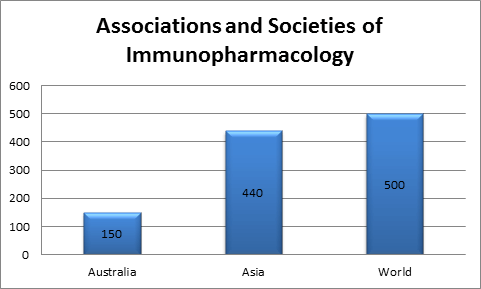
Universities of Pharmacology
Universities in Australia
- University of Melbourne
- Monash University
- La Trobe University
- RMIT University
- Victoria University
Universities in Asia
- University of Colombo
- University of Tokyo
- Osaka University
- AIMST University
- National University of Singapore
- National Taiwan University
- University of Delhi
Universities around the world
- Harvard University
- University of California
- The University of Manchester
- University of Oxford
- University of North Carolina
- University of Michigan
- Yale University
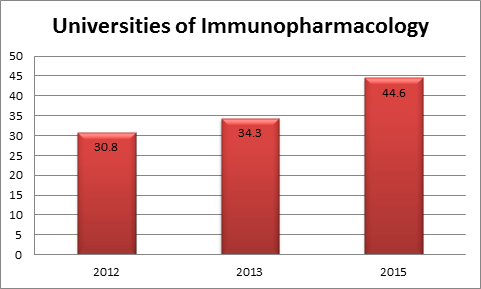
Market Report of Immunopharmacology:
The infectious immunology market is segmented based on types of diseases into HIV, hepatitis, pneumonia, tuberculosis, malaria, inflammatory bowel diseases and autoimmune diseases. Approximately, HBV affected nearly 1.4 million in the U.S. in 2011. The rising incidence of these infectious diseases creates a worldwide demand for immunological diagnostics and treatment. As indicated by the journal published by BioMed Central, rotavirus contamination the main source of serious getting dried out the runs among kids around the world. Consistently rotavirus disease causes an expected 111 million looseness of the bowels scenes prompting to 2 million hospitalization cases and 400,000 passing’s of youngsters less than 5 years. Out of all these 82% happen in youngsters in the poorest nations of Asia and Africa. According to Centers for Disease Control and Prevention (CDC), ceaseless HBV influenced right around 1.4 million of the US populace in 2011 and going about as real general wellbeing challenge. In recent years episodes for various diseases have disintegrated the circumstance. Every one of these reports co-ordinate towards the expanding requirement for immunological finding and treatment for contaminations over the world. Along these lines the market for this contamination immunology may develop with huge rate in not so distant future.
The Statistical representation of the students, researchers, physicians using the immunology and the pharmacology streams.
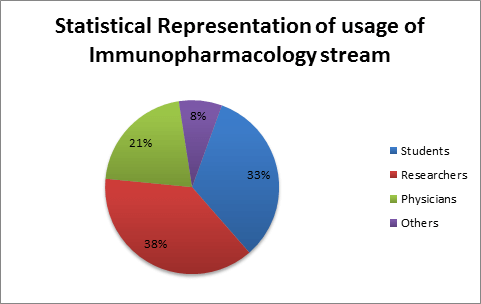
Market Analysis of immunotherapies
The global immunotherapies market reached $30.8 billion in 2012. This market is expected to grow to nearly $34.3 billion in 2013 and $67.9 billion in 2018 with a compound annual growth rate (CAGR) of 14.7% over the five-year period, 2013 to 2018.
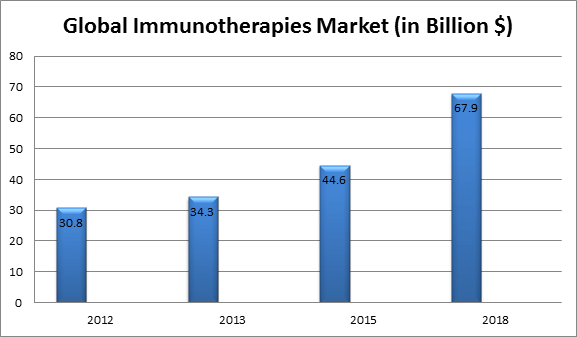
Conference Highlights
- Pharmacology & Toxicology
- Immunopharmacology
- Immunotoxicology
- Autoimmune Disorders
- Allergy
- Immunomodulators
- Toxicopathology
- Neuroimmunology
- Neuroimmunomodulation
- Immunopathology
- Immunotherapy
- Clinical Applications of Immunopharmacology
- Immuno Virology
- Immuno bacteriology
- Paediatric Immunology
- Veterinary Immunology
- Immunologists & Toxicologists
- Stems Cells and Immunity
- Latest research reviews and discoveries in immunology
- Antibody arrays
To share your views and research, please click here to register for the Conference.
To Collaborate Scientific Professionals around the World
| Conference Date | Nov 20-21, 2017 | ||
| Sponsors & Exhibitors |
|
||
| Speaker Opportunity Closed | Day 1 | Day 2 | |
| Poster Opportunity Closed | Click Here to View | ||
Useful Links
Special Issues
All accepted abstracts will be published in respective Our International Journals.
- Journal of Clinical & Experimental Pharmacology
- Biochemistry & Pharmacology: Open Access
- Journal of Clinical & Cellular Immunology
Abstracts will be provided with Digital Object Identifier by

